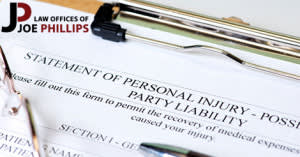Personal Injury Basics: What Is Behind a Personal Injury Case?
Dec. 28, 2015
 A personal injury case usually, if not always, arises from a tort claim. A tort is a wrongful act that causes damage to another person. In personal injury claims, that damage is usually an injury to the body or to the mind. It can also be damage to property or the ability to earn a future living as well.
A personal injury case usually, if not always, arises from a tort claim. A tort is a wrongful act that causes damage to another person. In personal injury claims, that damage is usually an injury to the body or to the mind. It can also be damage to property or the ability to earn a future living as well.
Here are some important things you should know about a personal injury case, and what exactly it may mean for you.
Types of Personal Injury Claims
Personal injury law covers a wide variety of types of injuries. Some of the most common types include:
Accidents: Accidents are by far the most common cause of personal injuries. For a valid personal injury claim, the accident must have occurred because of someone’s carelessness or inattentive action or inaction. They include things like car accidents, slip and fall accidents, medical errors, and many more.
Intentional Acts: Tort law also includes remedies for intentional acts. Occasionally these things are also crimes, including assault and battery. Tort law provides a civil remedy in additional to any criminal liability.
Defective Products: When a product is made or designed in a poor fashion, and it causes damage, the person that that the product damaged may have a tort claim. This claim could be against many people involved in the production or design process. This area of tort law is somewhat complicated, but these types of accidents are fairly common.
Remedies in Personal Injury Cases
Virtually any damage that you have in personal injury cases may be eligible for the civil remedy of monetary damages (a money award). The purpose of the personal injury system is to make the injured party “whole” again. Money damages are meant compensate for any loss that you may have that would result from someone else’s wrongful act.
You may be able to receive damages for the following:
Physical injuries
Mental injuries
Physical or mental injuries to a loved one
Property damages (car, home, etc.)
Medical expenses
Lost earnings/wages
Lost future wages/earnings
Loss of companionship/loss of consortium
Each potential damage area has different legal rules and obligations that must be met before a court or a jury can award in your favor. Your personal injury lawyer will be able to present your case in a way that increases your chances of being awarded damages.
Progressing Through a Personal Injury Case
Most personal injury cases follow a similar timeline. First, the Defendant does something that harms the Plaintiff. Then, the Plaintiff speaks to an experienced personal injury attorney to determine whether they have a case and what their options are.
In most situations, you will work with the other side to try to settle the case first. If that does not work, then the Plaintiff may file a lawsuit and make their way through the court process. Each case is different, so talk to your personal injury lawyer St. Louis today for more information about your unique situation.
